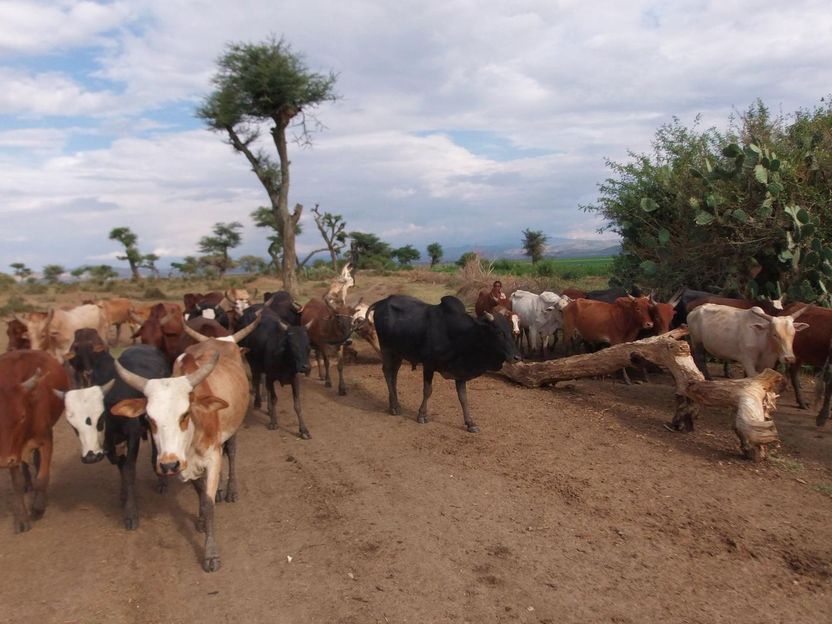Meat consumption must fall by at least 75 percent
However, in small quantities it can be quite sustainable
Advertisement
If our planet Earth is to continue feeding us in the future, rich countries must significantly reduce their meat consumption - ideally by at least 75 percent. This is the conclusion of a new study by the University of Bonn. The study reviews the current state of research on various aspects of meat consumption. In addition to the effects on the environment and climate, these include health and economic effects. A conclusion of the researchers: Eating meat in small amounts can be quite sustainable. The results are published in the journal Annual Review of Resource Economics.

In order to achieve the climate goals, - the high meat consumption must be reduced, especially in the industrialized countries. In contrast, in the Global South (here in Ethiopia), owning livestock provides a livelihood for many people.
ZEF/ Uni Bonn
Every EU citizen consumes around 80 kilograms of meat per year. But every juicy steak, every delicious sausage has a price that we do not pay at the counter, because livestock farming damages the climate and the environment. Ruminants for instance produce methane, which accelerates global warming. Animals also convert only a portion of the calories they are fed into meat. In order to feed the same number of people, meat therefore requires a much larger land area. This is to the detriment of ecosystems, as less space is left for natural species conservation. Furthermore, those eating too much meat live risky – meat in excess is not healthy and can promote chronic diseases.
So there are good reasons for significantly reducing consumption of animal-based foods. "If all humans consumed as much meat as Europeans or North Americans, we would certainly miss the international climate targets and many ecosystems would collapse," explains study author Prof. Dr. Matin Qaim of the Center for Development Research (ZEF) at the University of Bonn. "We therefore need to significantly reduce our meat consumption, ideally to 20 kilograms or less annually. The war in Ukraine and the resulting shortages in international markets for cereal grains also underline that less grain should be fed to animals in order to support food security.” At present, around half of all grains produced worldwide are used as animal feed, Qaim said.
Mass vegetarianism is not the best solution
Would it not be better for humankind to switch completely to vegetarian or, even better, vegan diets? According to the study, this would be the wrong consequence. On the one hand, there are many regions where plant-based foods cannot be grown. "We can't live on grass, but ruminants can," clarifies Qaim's colleague and co-author Dr. Martin Parlasca. "Therefore, if grassland cannot be used in any other way, it makes perfect sense to keep livestock on it." From an environmental point of view, there is also no real objection to careful grazing with a limited number of animals.
Poorer regions in particular also lack plant sources of high-quality proteins and micronutrients. For instance, vegetables and legumes cannot be grown everywhere and, moreover, can be harvested only at certain times of the year. "In such cases, animals are often a key element of a healthy diet," Parlasca points out. "For many people, they are also an important source of income. If the revenue from milk, eggs and meat is lost, this can threaten their livelihoods." In any case, the poorer countries are not the problem, the authors point out. For their inhabitants, meat is usually much less frequently on the menu than in industrialized nations. This means that the rich countries in particular must reduce their meat consumption.
Tax on meat products makes sense
At the moment, there is little sign of this. Although there are more vegetarians than before, aggregate meat consumption is stagnating across Europe. However, it is highest in North America and Australia. Qaim believes it is important to also consider higher taxes on animal-based foods. "That's certainly unpopular, especially since a ten- or twenty-percent surcharge probably wouldn't be enough, if it's supposed to have a steering effect," he says. "Meat, however, has a high environmental cost that is not reflected in current prices. It would be entirely reasonable and fair to have consumers share more of these costs."
The authors also call for the topic of "sustainable consumption" to be increasingly integrated into school curricula. These contents should also be better included into the training of future teachers. "We need to become more sensitive to the global impact of our decisions," emphasizes Qaim, who is also a member of the PhenoRob Cluster of Excellence and (like his colleague Martin Parlasca) of the Transdisciplinary Research Area (TRA) "Sustainable Futures" at the University of Bonn. "This is true not only with food, but also with the shirt we buy at the discount store to wear for a single evening at a party."






























































